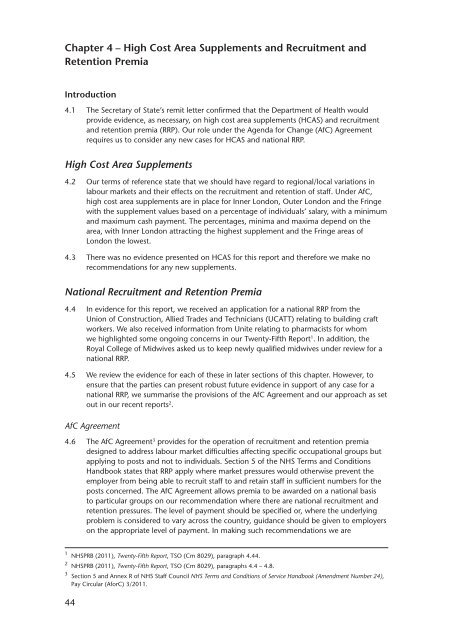NHS pay review body: twenty-sixth report 2012 - Official Documents
NHS pay review body: twenty-sixth report 2012 - Official Documents
NHS pay review body: twenty-sixth report 2012 - Official Documents
You also want an ePaper? Increase the reach of your titles
YUMPU automatically turns print PDFs into web optimized ePapers that Google loves.
Chapter 4 – High Cost Area Supplements and Recruitment and<br />
Retention Premia<br />
Introduction<br />
4.1<br />
44<br />
The Secretary of State’s remit letter confirmed that the Department of Health would<br />
provide evidence, as necessary, on high cost area supplements (HCAS) and recruitment<br />
and retention premia (RRP). Our role under the Agenda for Change (AfC) Agreement<br />
requires us to consider any new cases for HCAS and national RRP.<br />
High Cost Area Supplements<br />
4.2<br />
4.3<br />
Our terms of reference state that we should have regard to regional/local variations in<br />
labour markets and their effects on the recruitment and retention of staff. Under AfC,<br />
high cost area supplements are in place for Inner London, Outer London and the Fringe<br />
with the supplement values based on a percentage of individuals’ salary, with a minimum<br />
and maximum cash <strong>pay</strong>ment. The percentages, minima and maxima depend on the<br />
area, with Inner London attracting the highest supplement and the Fringe areas of<br />
London the lowest.<br />
There was no evidence presented on HCAS for this <strong>report</strong> and therefore we make no<br />
recommendations for any new supplements.<br />
National Recruitment and Retention Premia<br />
4.4<br />
4.5<br />
In evidence for this <strong>report</strong>, we received an application for a national RRP from the<br />
Union of Construction, Allied Trades and Technicians (UCATT) relating to building craft<br />
workers. We also received information from Unite relating to pharmacists for whom<br />
we highlighted some ongoing concerns in our Twenty-Fifth Report1 . In addition, the<br />
Royal College of Midwives asked us to keep newly qualified midwives under <strong>review</strong> for a<br />
national RRP.<br />
We <strong>review</strong> the evidence for each of these in later sections of this chapter. However, to<br />
ensure that the parties can present robust future evidence in support of any case for a<br />
national RRP, we summarise the provisions of the AfC Agreement and our approach as set<br />
out in our recent <strong>report</strong>s2 .<br />
AfC Agreement<br />
4.6<br />
3 The AfC Agreement provides for the operation of recruitment and retention premia<br />
designed to address labour market difficulties affecting specific occupational groups but<br />
applying to posts and not to individuals. Section 5 of the <strong>NHS</strong> Terms and Conditions<br />
Handbook states that RRP apply where market pressures would otherwise prevent the<br />
employer from being able to recruit staff to and retain staff in sufficient numbers for the<br />
posts concerned. The AfC Agreement allows premia to be awarded on a national basis<br />
to particular groups on our recommendation where there are national recruitment and<br />
retention pressures. The level of <strong>pay</strong>ment should be specified or, where the underlying<br />
problem is considered to vary across the country, guidance should be given to employers<br />
on the appropriate level of <strong>pay</strong>ment. In making such recommendations we are<br />
1 <strong>NHS</strong>PRB (2011), Twenty-Fifth Report, TSO (Cm 8029), paragraph 4.44.<br />
2 <strong>NHS</strong>PRB (2011), Twenty-Fifth Report, TSO (Cm 8029), paragraphs 4.4 – 4.8.<br />
3<br />
Section 5 and Annex R of <strong>NHS</strong> Staff Council <strong>NHS</strong> Terms and Conditions of Service Handbook (Amendment Number 24),<br />
Pay Circular (AforC) 3/2011.
















